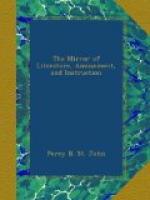Music whose melody is of the heart
And gifts that are not made for interest,—
Abundantly bestow’d, by nature’s cheek,
And voice, and hand! It is to live on life,
And husband it! It is to constant scan
The handiwork of heaven! It is to con
Its mercy, bounty, wisdom, power! It is
To nearer see our God!
JEALOUSY.
A dreadful question is it, when we love,
To ask if love’s return’d!
I did believe
Fair Julia’s heart was mine—I
doubt it now.
But once last night she danced with me,
her hand
To this gallant and that engaged, as soon
As asked for! Maid that loved would
scarce do this!
Nor visit we together as we used,
When first she came to town. She
loves me less
Than once she did—or loves
me not at all.
Misfortune liketh company: it seldom
Visits its friends alone.
A MAIDEN HEART.
A young woman’s heart,
Is not a stone to carve a posey on!
Which knows not what is writ on’t—which
you may buy,
Exchange or sell,—keep or give
away,
It is a richer—yet a poorer
thing!
Priceless to him that owns and prizes
it;
Worthless when own’d, not priz’d;
which makes the man
That covets it, obtains it, and discards
it,—
A fool, if not a villain.
A CURATE’S SON.
Better be a yeoman’s son!
Was it the rector’s son, he might
be known,
Because the rector is a rising man,
And may become a bishop. He goes
light.
The curate ever hath a loaded back.
He may be called yeoman of the church
That sweating does his work, and drudges
on
While lives the hopeful rector at his
ease.
* * * * *
CHARACTER OF GEORGE THE FOURTH.
In the third and concluding volume of the Life and Reign of George IV., (a portion of Dr. Lardner’s Cabinet Library,) we find the following summary of the earthly career of the late King—shaded with some admixture of severity, but, altogether, to be commended for the manliness and unflinching spirit in which it is written. Our contemporary biography sadly lacks vigorous and plain-speaking summaries of character.
“In the events and achievements which give interest and lustre to his regency and reign, George IV. had personally no share. He was but contemporary with them. To the progress of science, of literature, of legislation, he was a stranger. The jealous limitations of the regal power,—the independence, enterprise, and social advancement of the nation, would account and afford excuse for this: but were he absolute as Louis XIV.,—obeyed and imitated with the same implicit servility,—the higher purposes of intellectual being were beyond his range. With the fine arts his relations were more




